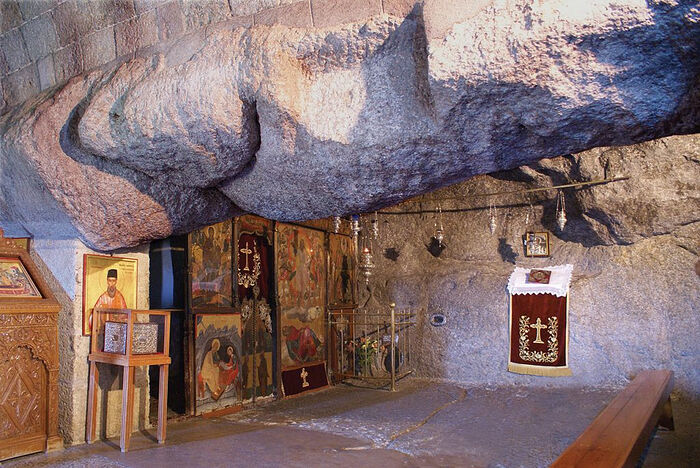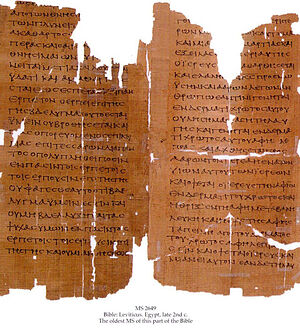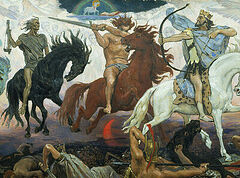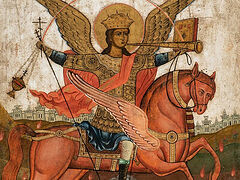If Christ is near, death is defeated
The Revelation of the Apostle John is the last book of the New Testament. The New Testament is not one book, but a collection of twenty-seven books. The last book, the Revelation of the holy Apostle and Evangelist John the Theologian, was also the last to be written. It’s a prophetic text that speaks about future events, about events that are taking place, and about events that have already happened, explaining them in a peculiar way, through images, visions, inspiration, and the use of symbols. The holy Apostle John, while on Patmos, saw what God showed him. If you’ve been to the island of Patmos, you know there is still the cave where the Apostle John, while in prayer, saw the revelation described in the book of Revelation.
 The cave of the Revelation, Patmos, Greece
The cave of the Revelation, Patmos, Greece
The word “apocalypse” means “to remove the veil from that which is hidden, that which is in darkness, that which is covered.” It’s the appearance of things, events, and messages that God wants to convey to man. And this revelation was given by God to the Apostle John because we needed to know it. Why do we need to know it? The path of this world is linear; it leads to an end. Christ told us about the end of the world; He told the world that it will end one day.
Certain events and signs will occur before the end, and it’s important for us Christians to be very attentive: Watch and pray, that ye enter not into temptation (Mt. 26:41). This is the message of Christ. Why is He talking about temptation? Because the closer we get to the end, the more false christs and false prophets will appear. Heresies will multiply, and many people will appear posing as prophets, people of God, saints, and those who receive messages from God.
What will all these false prophets be looking for? They will draw the people after themselves. It’s very dangerous, because it’s not just bodily harm. For example, someone can kill us, they can chop off our heads. This evil will affect only our body. Sooner or later, we’re going to die. If they cut our heads off a few years earlier, the world won’t collapse. But if we lose our soul, that’s eternal destruction. If we’re tempted, it’s for all eternity. It’s better for a man to die, to harm his body, than to lose his soul. But false prophets, false christs, false messiahs seek to destroy our souls, to lead us astray from the true path.
The pursuit of truth isn’t some kind of ideology—it’s the Church. Christ made His Church the pillar and ground of truth (Tim. 3:15). The Body of Christ is the Church (all of us, not just the bishops, priests, and deacons), just as the Apostles and saints organized and handed it down to us. And the Church is the keeper of the truth, the keeper of the books of the New Testament. But the books of the New Testament have no value unless their truth is sealed by the Church. The Church chose twenty-seven books and said they contain the truth, and they constitute the God-inspired books of Holy Scripture.
In the epistles of St. Athanasios the Great, we read that, according to the decisions of the Councils of bishops of the Church taking place at that time, many books of Holy Scripture (a few in particular, including Revelation) weren’t accepted by individual Local Churches. Some of the Local Churches believed that the Revelation of St. John the Theologian didn’t belong to the collection of the books of the New Testament, like the Epistle of the Apostle Paul to the Hebrews. Nowhere does it say that the Gospel of Matthew was written by the Apostle Matthew, or that the Gospel of Mark was written by the Apostle Mark. It was the Church that sealed that this text belongs to St. Mark, this one to St. John, this one to St. Paul. The Church established this.
There have been heresies since the first year after the Ascension of the Lord to Heaven and the beginning of the Apostolic preaching. The heretics tried to remake Apostolic Tradition according to their own perception and way of thinking. What did they do? They wrote texts and said this text was written, for example, by the Apostle Paul. And in those times, how could they figure out who wrote it? They signed it from St. Paul, from St. John, from St. Thomas, and offered them to Christians—the so-called apocryphal gospels that everyone’s afraid of.
The apocryphal gospels are mainly texts written by heretics, mostly Gnostics (a heresy in the early years of the Church’s existence, which greatly confused people at those times). They wrote texts, signing them with the names of the Apostles—St. James, St. Thomas, St. Paul, and distributed them among Christians, causing great confusion. Christians did not know the precise authorship of many texts.. Are they true? Are they authentic? It was a mess. The Church said then: “We accept as true only those texts that were written by the disciples of Christ, based on the view of the disciples of the Apostles.” There were disciples of the Apostles who were still alive then—St. Polycarp, St. Ignatios, and other successors of the Apostles who know what their teachers spoke about.
Today we often hear nonsense and even blasphemy attributed to St. Paisios. I lived by him for sixteen years and never heard such things from him. But someone who came to him once, or maybe didn’t even see him, is writing all kinds of stuff about him. But those of us who were close to him, listened to him, and knew what he spoke about, can judge whether Elder Paisios said all these absurdities that are attributed to him. Even during his lifetime people would come and say, “Elder Paisios said the war will start in three days!” He didn’t say anything like that, but these words were passed around orally.
Once a man came to him and said: “Geronda, in Athens we heard that the war is starting. Is that true?”
“Okay, and what are you thinking about doing if a war breaks out?”
“It’d be good to know if a war is starting. Then we’d go buy more of everything.”
“What do you plan to buy?”
“Milk, salt.”
“My dear, if the war starts, you’re going to go drink milk? Are you going to go cook something to eat? If a war breaks out, your mind’s going to turn to food and you’re going to rejoice that your cupboards are full? And if you don’t stock up on anything, will you feel like you’re in danger? What are you thinking?”
People often distorted the meaning of his words. One time a man came and visited him and said in their diocese they had such and such a bishop. The Elder said he knew him. Then this man went to the bishop and said,“I went to Elder Paisios and he said he knows you, and how wonderful you are!” But the Elder didn’t say anything like that.
Another time, a monk, a bit of a loafer, simple, intrusive, somewhat rude, came to see him in his kallyvia. He came and sat with Geronda for hours. The Elder got upset and asked him: “Since you have no questions, give me ten minutes to be in silence and pray.” The monk continued to sit and ask him about the weather, whether it would rain, whether the tomatoes would grow, whether the grapes would ripen. Did Geronda have time for such things? But he didn’t want to upset the monk. Then he invited him to go to church together and read the Psalter. The monk sat down in the church and the Elder went to read the Psalter. He only had one lung, so from time to time he would stop to take a deep breath. A man came up to the window of the church, and the Elder indicated to him to wait a little. This lazy monk left and then sent the Elder a letter. Listen to what he wrote: “It wasn't enough for you that you kept me at your place for so many hours, I lost so much of my time, but you also considered me to be possessed, took me to the church to read the Psalter over me, and then threatened me.”
Now it’s easy to make a statement, to tell people that you have nothing to do with this person, this theory, this news. You can inform society through the internet, radio, television, newspapers, and defend the truth. In the time of the Apostles, there was a serious problem in the Church until the era of St. Basil the Great: Heretics would write something, sign it with the names of saints, distribute their texts amongst the faithful, and this caused great confusion.
 Book of Leviticus, fragments of a second-century manuscript The Church said: “We accept nothing but what the Apostles, their successors, and the disciples of their successors taught us.” Thus appeared what the Church calls Apostolic Tradition. Who were the eyewitnesses of Christ? The Apostles. What the Apostles said is correct. Thus it was possible to gather the teachings of the Church and determine the canons of truth of the texts of Sacred Scripture. People could say these books are true, authentic, God-bearing, they make up the New and Old Testaments.
Book of Leviticus, fragments of a second-century manuscript The Church said: “We accept nothing but what the Apostles, their successors, and the disciples of their successors taught us.” Thus appeared what the Church calls Apostolic Tradition. Who were the eyewitnesses of Christ? The Apostles. What the Apostles said is correct. Thus it was possible to gather the teachings of the Church and determine the canons of truth of the texts of Sacred Scripture. People could say these books are true, authentic, God-bearing, they make up the New and Old Testaments.
In this way, the Church resolved this difficult problem, which found its final conclusion in the epistles of St. Athanasios the Great. This is one of the answers to Protestants, Jehovah’s Witnesses, and everyone who says today: “We recognize only the Holy Scriptures, but not the Church and its Tradition.” But what are they saying? The Sacred Scriptures were determined by the Church, whichsaid that they were Divinely inspired. St. Athanasios and the assembly of bishops said it. So how can you accept only the books that the Church chose while rejecting the Church itself? It’s absurd. The Church has established the authority and truth of Scripture. The Church is the seal of truth. The Church puts its seal on what is true and does not recognize what is false or falsified. The only reliable way of understanding and distinguishing what Christ said to us about false prophets, false messiahs, and false christs is the Church, the ark of truth and salvation.




